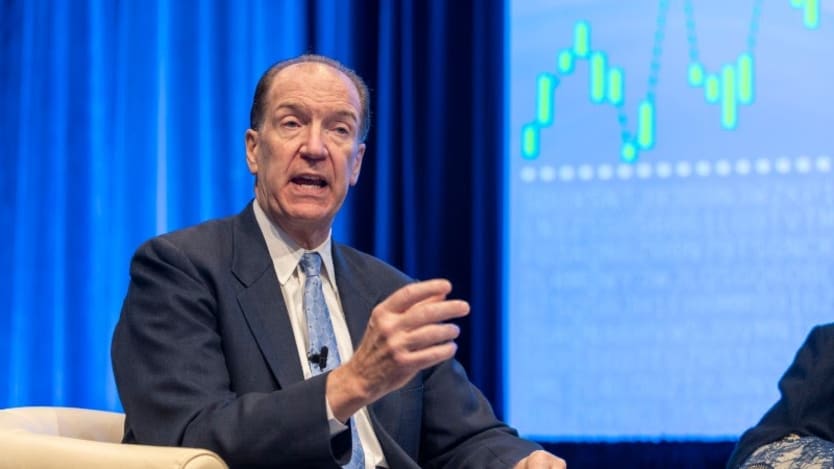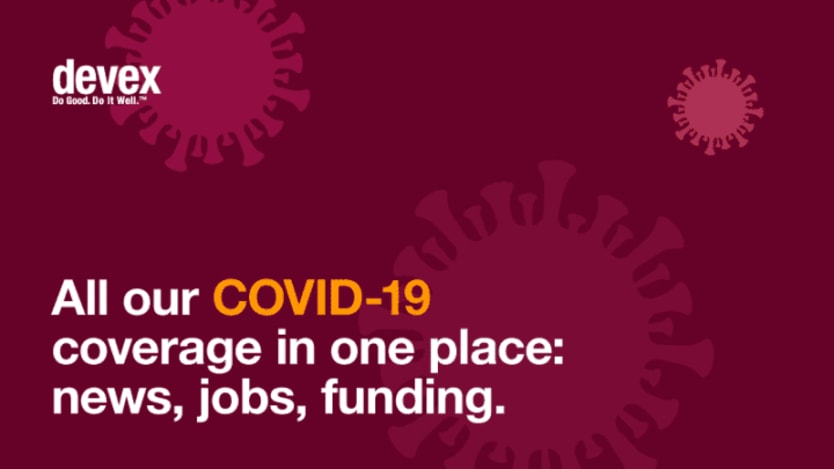
WASHINGTON — The World Bank’s Development Committee met virtually Friday to discuss the institution’s role in assisting low- and middle-income countries to respond to the wide-ranging impacts of the COVID-19 pandemic.
While development advocates hoped that the bank’s shareholders would send a strong signal that the institution should deploy even more resources for both emergency health operations and economic recovery programs in vulnerable countries, the committee of finance ministers did not appear to break much new ground on that front.
Their communiqué, issued after the meeting, welcomed the bank’s existing plan to deploy $150 billion to $160 billion over the next 15 months, and they pointed to capital increases and funding replenishments that have already took place as evidence that the bank “has the financial firepower to provide a meaningful long-term response to this crisis.”
“There’s a growing sense that we’re losing momentum on ambitious commitments.”
— Scott Morris, senior fellow, Center for Global DevelopmentThe absence of a strong message that the bank should rapidly and dramatically scale up its financing beyond what has already been announced left some development experts underwhelmed.
“It doesn’t appear that they’ve prioritized this statement as a place to move the ball forward on anything. It’s simply a rehash of everything out there,” said Scott Morris, senior fellow at the Center for Global Development.
“I think there’s a growing sense that we’re losing momentum on ambitious commitments,” Morris said.
The World Bank has initiated emergency health operations in 64 countries already and aims to have projects running in 100 countries by the end of the month, President David Malpass said in a press conference following the meeting. The bank’s three priorities are assisting the world’s poorest people, supporting jobs, and helping countries strengthen their emergency health systems, he added.
COVID-19 — a timeline of the coronavirus outbreak
Follow the latest developments on the new coronavirus that causes COVID-19.
“Everyone in this system [is] trying to break out of the boxes, break out of the boundaries, and do all that can be done in order to move us forward. That’s what the World Bank has been trying to do,” Malpass said.
Civil society groups expressed concern that without additional signs of financial support from the World Bank’s shareholders, the institution’s efforts to scale up emergency operations in the short term could come at the expense of other health and development priorities.
“Donors must also play their part —if the Bank’s fast-tracked funding isn’t followed up with new money, it is the equivalent to stealing money from the future and other urgent needs. We can't let women die in childbirth because general health funding has been redirected to the coronavirus response,” said Nadia Daar, head of Oxfam International’s Washington office, in a statement.
“While we welcome efforts made by the [World Bank Group] to respond to the health crisis, the response package [falls] short of ambition. It is primarily based on reprogramming and frontloading of resources,” said Maria José Romero, policy and advocacy manager at Eurodad, in a statement.
The shareholder representatives did, however, voice their support for multilateral cooperation — specifically calling for partnership between the World Bank, International Monetary Fund, and World Health Organization. That message comes on the heels of U.S. President Donald Trump’s announcement that he will suspend America’s contributions to WHO until a review of its management of the COVID-19 crisis takes place.
“There’s a tendency in a crisis to hunker down, and I think it’s a critical part of global cooperation to not do that, to look for teamwork with other countries.”
— David Malpass, president, World BankDuring his press conference, Malpass — a former Treasury official in the Trump administration — did not mention WHO by name, but he did call for international cooperation and warned against isolationism in the midst of the pandemic.
That comment arose from concerns Malpass shared about growing food insecurity in some parts of the world, including East Africa, where a massive locust infestation threatens to compound the economic and supply chain disruption brought about by COVID-19. Malpass said that with agricultural production threatened and lost income reducing people’s ability to make purchases, countries are experiencing both supply- and demand-side pressures to their food systems.
“What we have tried to discourage countries from doing is hoarding,” Malpass said.
“There’s a tendency in a crisis to hunker down, and I think it’s a critical part of global cooperation to not do that, to look for teamwork with other countries,” he added.
Malpass stressed that nations should avoid protectionism and keep their borders open to trade.
“I think countries need to step forward and say, ‘We’re not going to use the crisis as a reason to close our markets,’” he said.
Visit our dedicated COVID-19 page for news, job opportunities, and funding insights.









